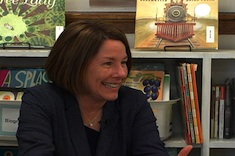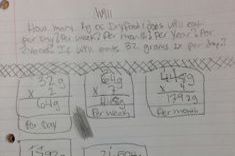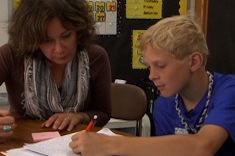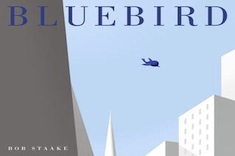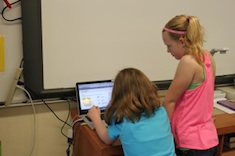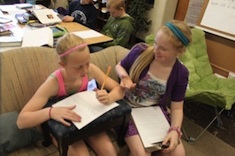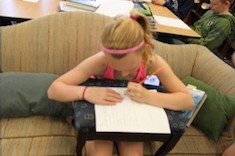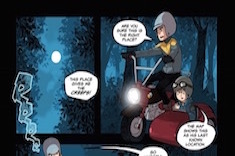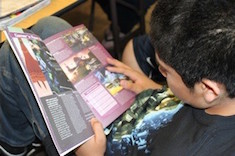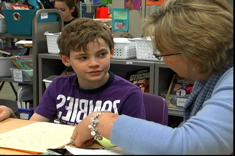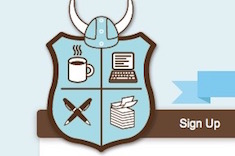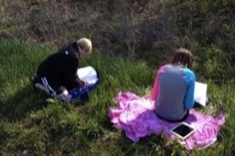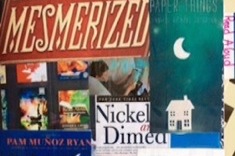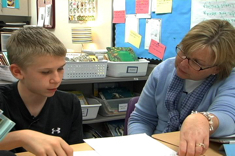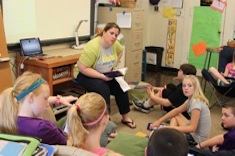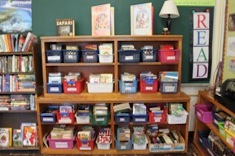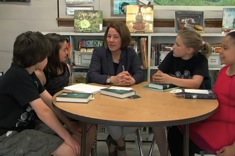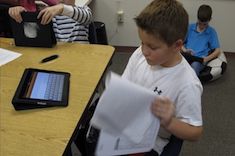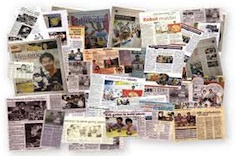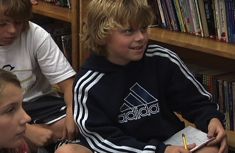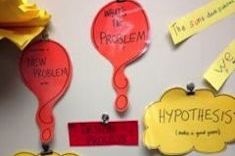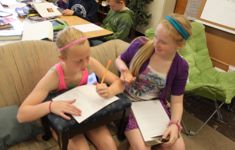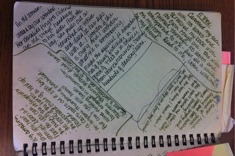5th
Latest Content
Wonder and React
How do you scaffold students for independent work? Melanie Meehan finds Wonder and React is a great strategy to use with fifth graders during an information writing unit.
Maintaining Momentum As a Writer
Jennifer Richard Jacobson chats with a group of fifth graders about how to generate ideas for writing independently each day.
“Giving Ourselves Hard Problems”: Rethinking Math Workshop
Mary Lee Hahn rethinks her math workshop structure to more closely align with the choice and problem solving in her reading and writing workshops.
Conferring Over “Finished” Writing
Ruth Ayres challenges Grant to add paragraphs to his “finished” piece.
Teaching Inference Through Picture Books
Katherine Sokolowski explains why picture books are useful for teaching inference to intermediate students, and shares some of her favorites.
Tech Anchor Charts
A daunting task for teachers is to help students learn to use new tech tools, as well as understand community standards for each one. Katherine Sokolowski finds tech anchor charts are a great way to provide ongoing support to students as they navigate new software and apps.
Ways into Personal Narratives
Katherine Sokolowski describes some Ways into Personal Narratives that use visual tools to build the home/school connection and stronger prewriting skills.
Resources for Quick-Writes
Katherine Sokolowski shares some of her favorite resources to jumpstart student interest in writing.
Using Webcomics in Classrooms
Katherine Sokolowski explains why she uses webcomics in her literacy workshops, and shares an extensive list of her favorite online sources.
Close Reading for Comparison in Fifth Grade
Katherine Sokolowski uses a fascinating picture book to build close reading skills with her fifth graders. The key is selecting a text that holds up well through multiple readings.
From Strengths to Revision: Conferring with Connor
Karen Terlecky confers with fifth-grade Connor about his writing, demonstrating the routine of celebrating strengths first, and then making suggestions of new techniques to try.
NaNoWriMo with Students
National Novel Writing Month (NaNoWriMo) is coming up in November, and it’s a wonderful opportunity for sustained writing and linking students with writers across the web. Katherine Sokolowski shares how it works, as well as tips for getting started.
A Fiction Writing Field Trip
Katherine Sokolowski’s students love writing fiction, but their skills don’t match their enthusiasm. A field trip helps bridge that gap.
Using Reading Notebook Covers for Reflection and Goal Setting
Clare Landrigan and Tammy Mulligan are using reading notebook covers in ingenious ways.
What Difference Does Difference Make?
Mary Lee Hahn begins the year with honest and open discussions with her fifth-grade students about diversity.
Adding Dialogue to Writing: Conferring with Sam
Karen Terlecky confers with Sam about adding dialogue to writing in her fifth-grade classroom.
Read Alouds as “Third Things”
Katherine Sokolowski uses read alouds early in the year to help students reflect on how to be kind and thoughtful members of a classroom community.
Strategies for Using Reader’s Notebooks
Melanie Swider enhances read alouds and the entire reading workshop with creative uses for reading notebooks.
Curating a Classroom Library
Katherine Sokolowski explains why it is important to sort and weed out books carefully before the new year begins.
Crafting Characters and Scenes
In this discussion with fifth graders about her book Paper Things, author Jennifer Richard Jacobson and the students share strategies and tools for visualizing scenes and characters when they are writing stories.
Digital Literacy Workshop
Maria Caplin has suggestions for making transitions to digital literacy in reading and writing workshops.
Donalyn Miller on Modeling Literate Lives (PODCAST)
Donalyn Miller, author of the acclaimed bestseller The Book Whisperer, chats with Franki Sibberson about the importance of teachers modeling their literate lives for students.
Note Taking for Research
Katherine Sokolowski helps her fifth graders build notetaking skills for research.
Choices for Paragraphs
Melanie Meehan finds third grade is a good age for helping students develop paragraphing skills.
Using Padlet with Students
Katherine Sokolowski finds Padlet is a great tool for compiling learning and building community.
Rethinking Reading Goals
Maria Caplin develops a system for helping students move beyond simple goals like noting the number of pages read.
Anchor Chart Changes
Mary Lee Hahn finds midyear is the perfect time for refreshing anchor charts.
Weekly Check-In Sheets
Are you finding effort from students is flagging? Katherine Sokolowski develops check-in sheets as a way to lift student energy and reflection.
Giving Students a Notebook Tour
Melanie Meehan finds a notebooks tour is a terrific minilesson for helping students expand the ways they use notebooks.
Using a Sketchbook as a Tool to Teach Grammar
Melanie Swider describes how she develops notebook pages for minilessons and conferring.
Browse Content By
Type
Category
- Assessment Tools
- Big Fresh Archives
- Booklists
- Choice Numeracy
- Classroom Design
- Common Core
- Community Building
- Conferring
- Content Literacy
- Digital Literacy
- English Language Learners
- Equity
- Family Relations
- Free Samples
- Guiding Groups
- Leadership
- Literacy Coaches
- Mentor Texts
- Minilessons
- New Teacher Mentors
- Podcasts
- Poetry
- Quote Collections
- Reading Strategies
- Self Care
- Struggling and Striving Learners
- Talking and Listening
- Teacher Study Groups
- Teaching Reading
- Teaching Writing
- Word Study and Vocabulary
Author
- Melissa Quimby
- Nawal Qarooni
- Gwen Blumberg
- Julie Cox
- The Lead Learners
- Hannah Tills
- Josie Stewart
- Ruth Metcalfe
- Mallory Messenger
- Becca Burk
- Jodie Bailey
- Vivian Chen
- Mary Brower
- Tiffany Abbott Fuller
- Stephanie Affinito
- Ruth Ayres
- Leigh Anne Eck
- Heather Fisher
- Shari Frost
- Julie Johnson
- Suzy Kaback
- Gigi McAllister
- Shirl McPhillips
- Melanie Meehan
- Cathy Mere
- Debbie Miller
- Tara Barnett and Kate Mills
- Tammy Mulligan
- Dana Murphy
- Bitsy Parks
- David Pittman
- Brenda Power
- Heather Rader
- Matt Renwick
- Mandy Robek
- Christy Rush-Levine
- Gretchen Schroeder
- Jen Schwanke
- Brian Sepe
- Katherine Sokolowski
- Stella Villalba
- Jennifer Vincent
Grade Level
Choice Literacy Membership
Articles
Get full access to all Choice Literacy article content
Videos
Get full access to all Choice Literacy video content
Courses
Access Choice Literacy course curriculum and training


